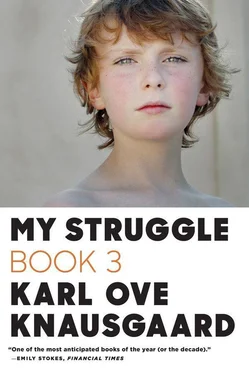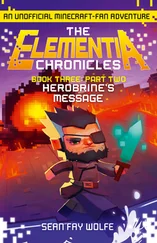When one Easter I made a new friend while visiting my grandparents in Sørbøvåg, I implored him again and again to stop swearing. I can remember how afraid I was that he would disobey my instructions when he came in with me and said hello to Grandma and Grandad, and how many times I had told him to promise not to swear. Afterward he avoided me and I coped with this by thinking that I had done the right thing. I offered my seat to elderly people on the bus, asked if I could carry something for them when they came out of supermarkets, never held on to the back of cars, never broke anything, never fired a slingshot at birds, looked where I walked so as not to tread on ants or beetles, and even when I picked flowers in the spring with Geir or anyone else to give to Mom or Dad, my heart sank at the thought of the lives I was taking.
In winter, after snowfalls, I wanted to help old people shovel it away. On one such day — it was a Monday after school and it had snowed heavily all night — I tried to persuade Geir to come with me to clear someone’s drive. It was only by hinting that the old man would probably give us a tip for helping him out that I managed to get Geir to join me. Dad had just bought a new snow shovel, the type called the Sørland shovel, red and shiny, and as he had shoveled our drive that morning I assumed he wouldn’t need it any more that day, so I went off with it, side by side with Geir, who was pushing his family’s green Sørland shovel in front of him. The house I had chosen was on the bend and, when we rang, the face of the old man opening the door lit up when he realized that we weren’t there to throw snowballs at his house, which many did, but to help him clear his drive. It was heavy work but fun; we dug a channel along which we could push the snow, over the edge into the ditch, we tipped it here and it rushed down like mini avalanches. The sky was a leaden gray, the snow so wet that water ran from it if you packed it together. From Torungen we heard the blare of the foghorn. Children raced downhill on sleds or skis, cars going up the hill on their way home from work skidded and spun. It took us an hour to finish the drive. We went to the front door and told the old man, he thanked us, and then he closed the door. Geir sent me an accusatory look.
“Weren’t we supposed to get money for this?” he said.
“Ye-es. Actually we were. But it’s not my fault he didn’t give us any …”
“Have we done all this for nothing?”
“Looks like it,” I said. “Doesn’t matter. Come on, let’s go.”
He followed me, grumbling. As we reached the road in front of our house I saw Dad standing in the doorway. My heart felt as though it had stopped beating. My stomach contracted and I could hardly breathe. His eyes were wild.
“Now you come here this minute!” he shouted when I was in the drive. I fixed my eyes on the ground over the last few steps.
“Look at me!” he said.
I raised my head.
He slapped my face.
I gasped.
Then he grabbed the lapels of my jacket and pressed me against the wall.
“Did you take my Sørland shovel?” he said. “It’s brand new! And it’s mine! Don’t touch my things! Do you understand? You didn’t ask me for permission! I thought it had been stolen!”
I was crying and sobbing so much I barely heard what he said. He grabbed my jacket again, pushed me through the door, and sent me flying into the wall on the other side.
“Don’t you ever do that again! Never! Go up to your room and stay there until I tell you otherwise! Have you understood?”
“Yes, Dad,” I said.
He slammed his study door and I began to remove my outdoor clothes. My hands were shaking. I took off my mittens and hat, I wriggled out of my boots, then the Puffa pants, then the jacket, then the thick sweater. In my room I lay down on my bed. Everything inside me was red raw. I sobbed and tears streamed down over my pillow as a fearful anger took hold of me, tore me this way and that, I didn’t know what to do with it. I hated him and I had to get my revenge. I would get my revenge. He’d soon see. I would crush him. Crush him.
Then it struck me: what would a nice boy do? What would a true Christian do?
He would forgive.
Once the thought was there, a warmth spread through me.
I would forgive him.
It was a big thought.
And it made me a big person.
But only when I was alone. When I was in the same room as him it was as though he swallowed up everything inside me, there was only him left, I couldn’t think about anything else.
The first day alone with Dad was to form a pattern for all the other days of the year to follow. Breakfast ready on the table, packed lunch in the fridge, off shopping when I came home, sitting and answering questions while he cooked, interspersed with little jibes followed by the constant Straighten your back, boy — sometimes I had to stay there until he had finished, sometimes he could suddenly say, Off you go, as though he did actually understand what a torment I found these half-hour sessions where I was supposed to keep him company — then we ate and for the rest of the evening I was alone with Yngve upstairs, or outdoors, while he was either at meetings or working in his study. Once a week we went to Stoa after school to do a big shop. In the evenings he would sometimes watch TV with us. We gave him nothing: we sat stiff-backed, without moving and without speaking. If he asked us something we answered in monosyllables.
Gradually he began to turn away from Yngve and spend more and more time with me. I never dared to be as sullen and tight-lipped as my brother.
But it didn’t always work.
His footsteps on the stairs, they were an ominous sign. If I was playing music I kept it down low. If I was reading on my bed I sat up so as not to seem too casual.
Was he coming here?
He was.
The door opened, there he stood.
It was eight o’clock; he hadn’t been upstairs since the meal at four.
His eyes took in the room. And stopped at the desk.
“What have you got there?” he said. Came in, lifted the pack of cards. “Shall we play?”
“Yes, if you like,” I said, putting down my book.
He sat beside me on the bed.
“I’ll teach you a new game,” he said. Lifted the pack and threw all the cards around the room.
“Fifty-two card pick-up, it’s called,” he said. “Away you go. Pick them up!”
I had thought he really wanted to play cards and was so disappointed he was only messing around and I had to go down on my knees and pick up all the cards while he sat on the bed laughing that I muttered an expletive.
I would never have said it if I had been thinking.
But I hadn’t been, and it slipped out.
“Bloomin’ heck!” I said. “Why did you do that?”
He stiffened. Grabbed my ear and stood up as he twisted.
“Are you swearing at your own father?” he said and twisted harder and harder until I burst into tears.
“Now you pick the cards up, boy!” he said, keeping hold of my ear while I bent down and started picking up the cards.
Once it was done he let go and left. When it was time for supper he was in his study and when we went into the kitchen he had prepared everything.
The next day he didn’t call me in while he was cooking, as he usually did. A call from the kitchen only came when the food was ready. We sat down, helped ourselves without a word, whale steak with gravy and onions and potatoes, we ate in total silence, thanked him, and left the table. Dad washed up, ate an orange in the living room, I could tell by the aroma, and drank a cup of coffee, I could hear from the hiss of the coffee pot, went down to his study, where he played some music before putting on his coat, going to the car, and driving off.
Читать дальше












